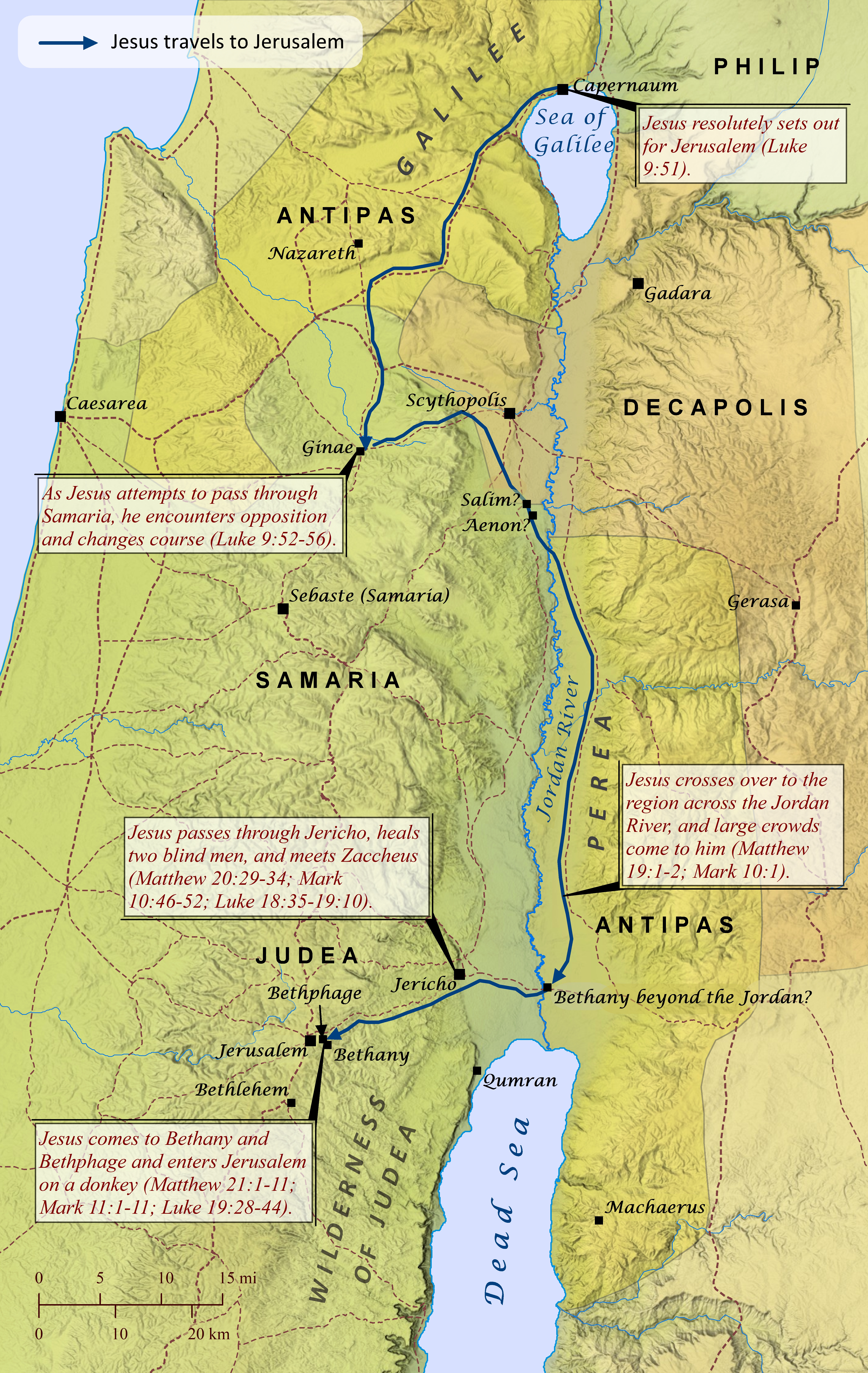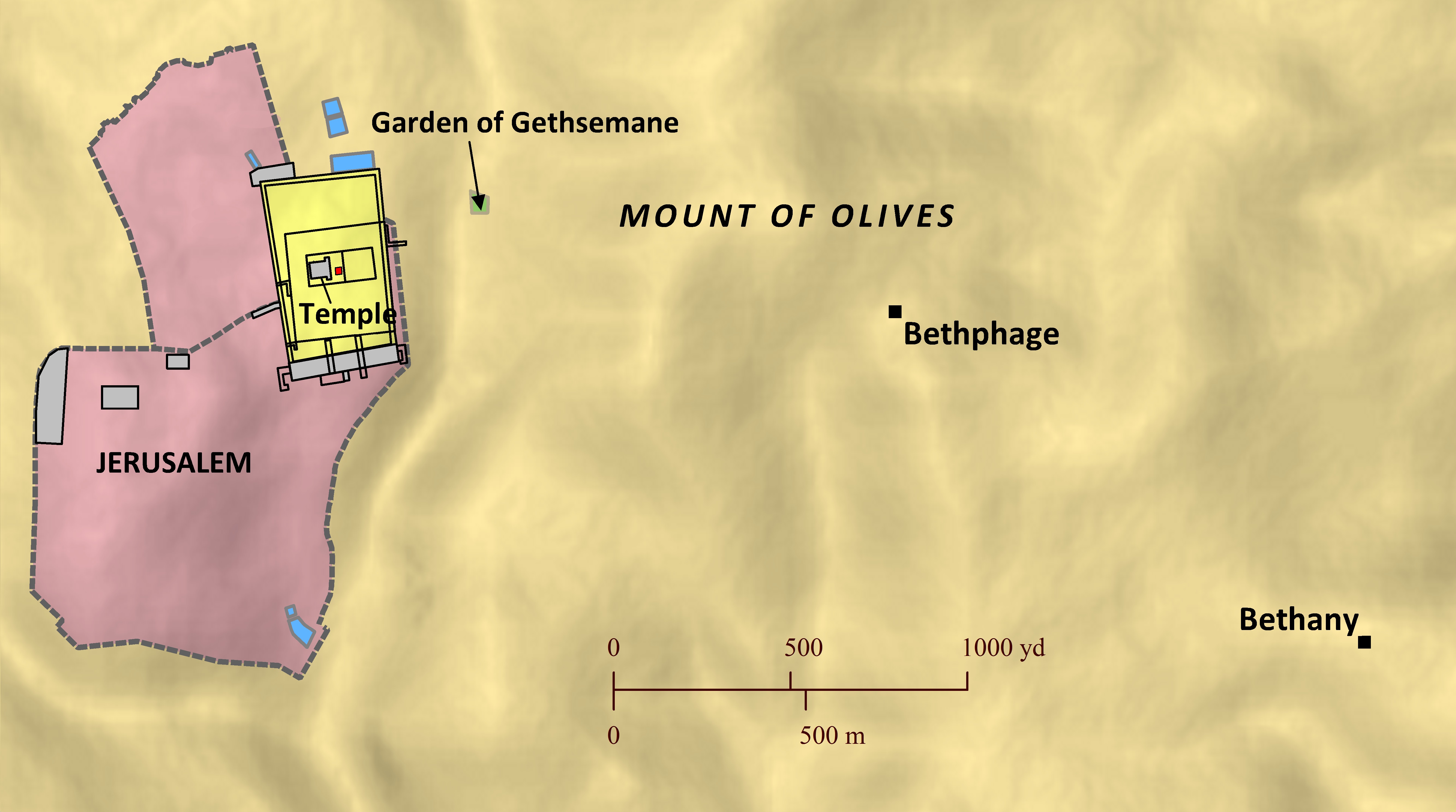Readers’ Version
Literal Version
19 After that, Yeshua entered Yericho and continued walking through it. 2 Then, look, there was a man named Zacchaeus and he was a chief tax-collector and pretty wealthy. 3 He wanted to see who this Yeshua was, but couldn’t see over the crowd because he[fn] was rather short, 4 so he ran along ahead of the crowd and climbed a sycamore tree so that he could see Yeshua as he walked past. 5 However, as Yeshua came to that place, he looked up and said, “Zacchaeus, hurry up and get down because I think it would be good to stay at your place.” 6 So he hurried down the tree and happily welcomed him.
7 But everyone who had observed it was grumbling, “Hoy, he’s going to stay with a sinful man.”
8 At dinner, Zacchaeus stood and said to the master, “Listen, master, I’m giving half of everything I own to the poor, and anyone that I defrauded, I’ll pay them back four times over.”
9 “Salvation came to this home today,” responded Yeshua, “as this man has also shown that he’s Abraham’s offspring, 10 [ref]because humanity’s child came to look for those who are lost, and save them.”
2 And see, a_man being_called by_the_name Zakⱪaios, and he was a_chief_tax_collector, and he was rich.
3 And he_was_seeking to_see the who Yaʸsous is, and was_ not _able because_of the crowd, because he_was the small in_stature.
4 And having_run_ahead ahead, he_went_up in a_sycamore_tree, in_order_that he_may_see him, because he_was_going to_be_passing_through of_that way.
5 And as he_came to the place, the Yaʸsous/(Yəhōshūˊa) having_looked_up, said to him:
Zakⱪaios, having_hurried come_down, because/for today it_is_fitting me to_remain in the house of_you.
6 And having_hurried, he_came_down and welcomed him rejoicing.
7 And all having_seen it, were_grumbling saying, that He_came_in to_lodge with a_sinful man.
8 And Zakⱪaios having_been_stood, said to the master:
Behold, the half of_the things of_me possessing, master, I_am_giving to_the poor, and if I_defrauded anything of_anyone, I_am_giving_back quadruple.
9 And the Yaʸsous said to him, that Today salvation this to_ the _house became, as_much_as he also is a_son of_Abraʼam/(ʼAⱱrāhām).
10 For/Because the son of_ the _man came to_seek and to_save the thing having_been_lost.
11 Then Yeshua went on to tell a parable to those who heard all that, because he was getting near to Yerushalem and they had assumed that God’s kingdom was going appear straight away. 12 Because of that, he told them, “Once a man of high status was going to a distant country to inherit a kingdom, and then to return after that. 13 So he called his ten slaves and gave them ten silver coins and told them to put them to work until he got back. 14 But his citizens hated him and sent a delegation out to him to say, ‘We don’t want this man to reign over us.’
15 “But he received his kingdom and then he headed back and sent for those slaves that he had given the silver to, to find out how well they’d traded. 16 The first slave arrived and said, ‘Master, I used your silver coin to earn ten more coins.’ 17 ‘Well done good slave,’ he said, ‘and because you were faithful with a little, I’ll put you in charge of ten cities.’ 18 Then the second slave came and said, ‘Your silver master, gained five more coins.’ 19 ‘You too,’ the master said, ‘will be put in charge of five cities.’ 20 Then another slave came and said, ‘Master, look, here’s your silver that I kept hidden away wrapped in a handkerchief 21 because I was scared of you, knowing that you’re a hard man—picking up what you didn’t put down, and harvesting where you didn’t sow.’ 22 ‘I’ll judge you by your own words,’ the master said, ‘you evil slave! You knew that I’m a hard man, picking up what I didn’t put down, and harvesting what I didn’t sow. 23 So why didn’t you take my silver to the bank? Then went I returned, at least I would have been able to collect some interest.’ 24 Then the master told the others who were standing there, ‘Take the silver coin away from him and give it to the slave who has the ten.’ 25 But they protested, ‘Master, he already has ten coins.’ 26 [ref]‘I’m telling you all,’ the master replied, ‘that everyone who has, will be given more, but the person who doesn’t have, even what they have will be taken away from them. 27 [ref]However, about those enemies of mine who didn’t want me to reign over them: bring them here and strike them down in front of me.’ ”
12 Therefore, he_said, a_ certain noble _man was_gone to a_country distant, to_receive for_himself a_kingdom and to_return.
13 And having_called ten slaves of_himself, he_gave ten mnas_of_silver to_them, and told to them:
To_do_business at the time I_am_coming.
14 But the citizens of_him were_hating him, and they_sent_out a_delegation after him saying:
We_are_ not _willing this man to_reign over us.
15 And it_became on the way of_him to_return, having_received the kingdom, and he_said the these slaves to_be_called to_him to_whom he_had_given the silver, in_order_that he_may_know what they_bartered.
16 And the first arrived saying:
Master, the mna_of_silver of_you, additionally_earned ten.
mnas_of_silver.
17 And he_said to_him:
Well done good slave.
Because you_became faithful in least, be having authority over ten cities.
18 And the second came saying:
The mna_of_silver of_you, master, made five mnas_of_silver.
19 And he_said also to_this one:
Also you be_becoming over five cities.
20 And the another came saying:
Master, see, the mna_of_silver of_you, which I_was_having lying_away in a_handkerchief.
21 For/Because I_was_fearing you, because you_are a_ austere _man, you_are_taking_up what you_ not _laid, and you_are_reaping what you_ not _sowed.
22 He_is_saying to_him:
I_will_be_judging you out_of the mouth of_you, evil slave.
You_had_known that I am a_ austere _man, taking_up what I_ not _laid, and reaping what I_ not _sowed?
23 And for_ why _reason you_ not _gave the silver of_me to the_bank, and_I having_come, I_collected wishfully it with interest?
24 And to_the ones having_stood_by he_said:
Take_away the mna_of_silver from him, and give it to_the one, having the ten mnas_of_silver.
25 And they_said to_him, master he_is_having Ten, mnas_of_silver already.
26 I_am_saying to_you_all that to_everyone the one having, will_be_being_given, but from the one not having, even what he_is_having will_be_being_taken_away.
27 However these the enemies of_me, the ones not having_wanted me to_reign over them, bring here and strike_ them _down before me.
28 After he’d said that, Yeshua continued on towards Yerushalem, 29 and as he got near to Bethfage and Bethany going towards the Mt. of Olives, he sent two of his followers ahead, 30 telling them, “Go on to the next village, and when you enter it, you’ll see a colt that’s never been ridden tied up there. Untie it and bring it here. 31 But if anyone asks you why you’re untying it, tell them that the master needs it.”
32 So they went off and found it just like he’d told them, 33 and when they were untying the colt, the owners asked them, “Why are you untying the colt?”
34 “The master needs it,” they answered. 35 So they led it back to Yeshua, and after throwing some of their clothes over it, they mounted him on it. 36 Then as the colt moved along, they spread more of their clothes on the road.
37 As he was about to descend down the slope of the Mount of Olives, the whole crowd of followers started celebrating and loudly praising God for all the miracles they’d seen, 38 [ref]saying, “The coming king has been blessed in the name of Yahweh. May there be peace in heaven and brilliant splendour up high there.”
39 There were some members of the Pharisee party in the crowd and they suggested to him, “Teacher, tell your followers to stop!”
40 “I’m telling you,” Yeshua answered, “that if all of these people stayed silent then the stones would start shouting.”
29 And it_became as he_neared to Baʸthfagaʸ and Baʸthania, toward the mountain which being_called of_Olives, he_sent_out two of_the apprentices/followers 30 saying:
Be_going into the village ahead, in which entering_in you_all_will_be_finding a_colt having_been_bound, on which no_one ever of_people sat_down, and having_untied it, bring it.
31 And if anyone may_be_asking you_all:
for_ Why _reason you_all_are_untying it?
Thus you_all_will_be_saying, that The master is_having need of_it.
32 And having_gone_away they having_been_sent_out found it as he_said to_them.
33 And of_them releasing the colt, the masters of_it said to them:
Why are_you_all_untying the colt?
34 And they said, that The master is_having need of_it.
35 And they_led it to the Yaʸsous/(Yəhōshūˊa), and having_throw_on the clothes of_them on the colt, the they_mounted_ Yaʸsous _on_it.
36 And of_him going, they_were_spreading_under the clothes of_themselves on the road.
37 And of_him nearing already at the down_grade of_the Mount of_ the _Olives, all the multitude of_the apprentices/followers began rejoicing to_be_praising the god with_a_ loud _voice for all the_miracles which they_saw 38 saying:
Having_been_blessed is the king the one coming, in the_name of_the_master, in heaven peace and glory in the_highest.
39 And some of_the Farisaios_party from the crowd said to him:
Teacher, give_rebuke to_the apprentices/followers of_you.
40 And answering he_said:
I_am_saying to_you_all that if these will_be_keeping_silent, the stones will_be_crying_out.
41 As Yeshua got closer to Yerushalem, he cried over it, 42 saying, “If only you knew how to obtain peace today, but it’s been hidden from your eyes, 43 because in the future, your enemies will surround you and build a palisade around you and attack you from every side. 44 Then they’ll level you and your children along with you, and they’ll topple the stone walls and buildings, because you didn’t realise the importance of who was visiting you.”
43 Because days will_be_coming on you, and the enemies of_you will_be_throwing_around a_palisade to_you, and they_will_be_surrounding you and they_will_be_pressing you on_every_side, 44 and they_will_be_leveling you and the children of_you with you, and they_˓will˒_ not _be_leaving a_stone on a_stone with you, instead_of which you_ not _knew the season of_the visitation of_you.
45 Then Yeshua went into the temple and started throwing out the traders, 46 [ref]telling them, “It’s been written that ‘my house will be a place of prayer,’ but you’ve made it into a den for robbers.”
47 [ref]After that, he taught in the temple every day, but the chief priests and the religious teachers were looking for a way to execute him, 48 but they didn’t come up with a plan, because all the people loved to listen to him.
19:3 It’s commonly assumed that Zacchaeus was the short person in this sentence, but the Greek is ambiguous. (See https://www.biblicalarchaeology.org/daily/biblical-topics/new-testament/jesus-the-short-king/.)
It_has_been_written:
The house of_me will_be a_house of_prayer, but you_all made it a_hideout of_robbers.
47 And he_was teaching which in_every day in the temple, but the chief_priests and the scribes and the leaders of_the people were_seeking, to_destroy him, 48 and they_were_ not _finding which what they_may_do, because/for the all the_people was_hanging_on hearing of_him.



